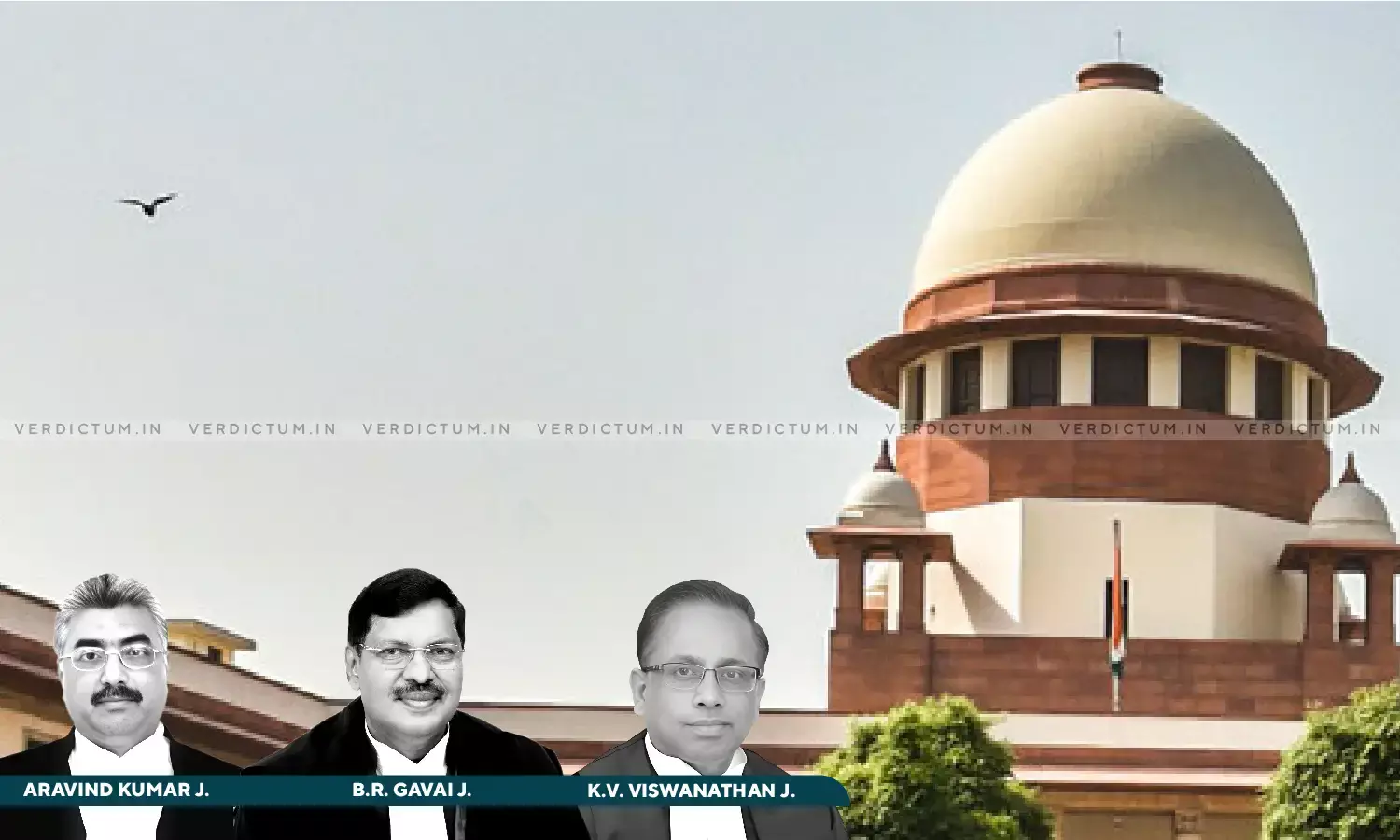25 Years Imprisonment Without Remission Would Be “A Just Dessert”- SC Commutes Death Sentence Of Convict In 4-Year-Old Boy’s Sexual Assault & Murder Case
The Supreme Court has commuted death sentence of a man who was convicted for sexual assault and murder of a four-year-old child.
The Court was deciding a Criminal Appeal filed by the convict against the Judgment of the Gujarat High Court by which it confirmed his conviction and sentence of death.
The three-Judge Bench of Justice B.R. Gavai, Justice Aravind Kumar, and Justice K.V. Viswanathan observed, “Even though the case of the appellant falls short of the rarest of rare category, considering the nature of the crime, we are strongly of the view that a sentence of life imprisonment which normally works out for 14 years would be grossly disproportionate and inadequate. Having regard to the nature of the offence, a sentence of imprisonment for a prescribed period without remission would alone be proportionate to the crime and also not jeopardize the public confidence in the efficacy of the legal system. … we hold that a sentence of imprisonment for a period of 25 (twenty-five) years without remission would be ‘a just dessert’.”
The Bench noted that it is not the case where it can be said that the possibility of reformation is completely ruled out and the option of life imprisonment is also not foreclosed. It added that the case does not fall in the category of rarest of rare case.
Senior Advocate Uttara Babbar appeared for the Appellant/convict while AOR Swati Ghildiyal appeared for the Respondent/State.
Factual Background -
In April 2016, a four-year-old child was found murdered in the village outskirts. The Appellant stood trial for the offences of kidnapping, sexual assault, and murder of the said child and was convicted and sentenced to death by the Trial Court. The High Court confirmed the same for the offences punishable under Sections 302, 364, and 377 of the Indian Penal Code (IPC) and Sections 4 and 6 of the Protection of Children from Sexual Offences Act, 2012 (POCSO Act). As per the prosecution case, the Appellant allegedly took the child and when inquired by someone, he said that he will buy the child ice-cream and return in a while. Since the child did not return, the search was carried out by the villagers.
On reaching the bank of a lake, the dead body of the child was found lying naked near the bushes. Pursuantly, a Complaint was lodged which resulted in registration of an FIR and the subsequent proceedings. After the inquest, the body of the deceased was sent for postmortem and the postmortem report revealed that the death was due to asphyxia due to throttling. A number of injuries were found on the body of the deceased and it was further revealed that the child was subjected to penetrative sexual assault through the anus. Accordingly, the Appellant was arrested. As the High Court confirmed his conviction and death sentence, he was before the Apex Court.
The Supreme Court after hearing the contentions of the counsel, elucidated, “It is well settled that if the accused is last seen with the deceased and particularly in a case of this nature when the time gap between the last seen stage and occurrence of death is so short, the accused must offer a plausible explanation as to how he parted company with the deceased and the explanation offered must be satisfactory.”
The Court added that, Section 106 of the Evidence Act mandates that when any fact is especially within the knowledge of any person, the burden of proving that fact is upon him and if an accused fails to offer an explanation, he fails to discharge the burden cast upon him under Section 106 and if he fails to offer a reasonable explanation that itself provides an additional link in the chain of circumstances.
“The argument of Ms. Uttara Babbar, learned senior counsel is that no DNA test was carried out. No doubt, the DNA test was not carried out and it would have been better for the prosecution to have done the same. However, keeping the overall conspectus of the case in mind, we do not think that not conducting DNA test was fatal to the prosecution”, it said.
The Court further noted that the deceased was subjected to a brutal sexual assault and the injuries as evidenced in the postmortem report indicate that the deceased was subjected to aggressive penetrative sexual assault.
“The injury on the prepuce of the penis of the accused along with the matching of the blood group coupled with other circumstantial evidence clearly constitute foundational facts for raising presumption under Sections 29 and 30 of the POCSO Act”, it added.
The Court said that the manner in which the Appellant enticed the deceased child under the pretext of buying ice-cream in spite of being dissuaded by the aunt and without the consent of the lawful guardians also makes out an offence under Section 364 of IPC and hence, the aggravated penetrative sexual assault clearly establishes offence under Section 377 of IPC and Sections 4 and 6 of the POCSO Act.
“The Trial Court has imposed the sentence of death and the High Court has confirmed the same. It is time for us to draw up a balance sheet of the aggravating and mitigating circumstances to decide whether the case falls in the category of rarest of rare case”, it also remarked.
Accordingly, the Apex Court partly allowed the Appeal, upheld the conviction, and commuted the death sentence.
Cause Title- Sambhubhai Raisangbhai v. State of Gujarat (Neutral Citation: 2024 INSC 987)
Appearance:
Appellant: Senior Advocate Uttara Babbar, AORs Arunava Mukherjee, Nirmal Chopra, Advocates Manasa Ramakrishna, Bhavesh Seth, Manan Bansal, Rayana Mukherjee, Maitreyi Misra, Veera Mahuli, Nisarg P. Khatri, and Ramesh Kumar Sahu.
Respondent: AOR Swati Ghildiyal, Advocates Devyani Bhatt, Neha Singh, and Rishi Yadav.




